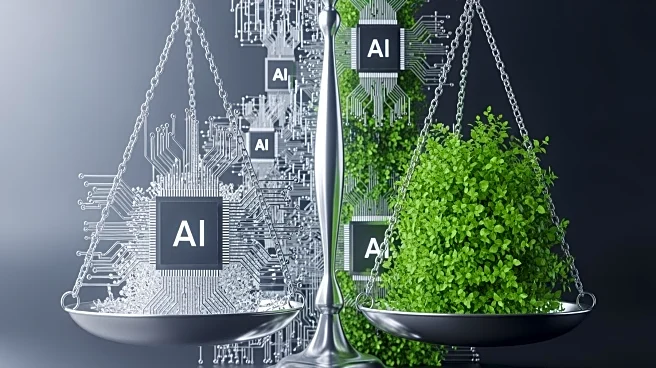What's Happening?
Artificial Intelligence (AI) is increasingly becoming a pivotal technology in reshaping organizational operations and value delivery. The rapid expansion of AI, fueled by significant public and private
investments, is driving substantial economic and social changes. However, it also raises critical questions regarding its environmental impact, ethics, and governance. A series of discussions involving industry leaders and experts from companies like Capgemini, Salesforce, and Siemens UK, as well as academic institutions such as the Cambridge Institute for Sustainability Leadership, have explored AI's intersection with sustainability. These discussions have highlighted AI's potential to enhance sustainability reporting, streamline emissions tracking, and support biodiversity protection, while also posing challenges to achieving environmental goals.
Why It's Important?
The integration of AI into sustainability practices is crucial as businesses face increasing pressure to demonstrate measurable progress in environmental goals. While AI offers tools for operational efficiency and resource optimization, its energy consumption and carbon footprint remain concerns. Only 29% of organizations currently use AI for sustainability, but 51% plan to invest in AI technologies soon. Despite its potential, only 6% of industry professionals consider AI ethical, and 92% call for stronger regulation. The balance between AI's transformative potential and its environmental impact is essential for aligning with long-term sustainability goals.
What's Next?
Businesses are encouraged to adopt a 'human in the loop' approach to ensure accountability and context in AI applications. Setting standards for low-carbon and ethical AI solutions is critical, with companies urged to embed sustainability requirements into supplier contracts. This includes minimum thresholds for energy efficiency and ethical practices. The focus is on driving efficiency, transparency, and innovation while ensuring alignment with sustainability objectives. Companies must assess AI providers' energy consumption data and push for greater visibility across the value chain.
Beyond the Headlines
The ethical implications of AI in sustainability are significant, as transparency in data center supply chains is lacking. This makes it challenging for companies to measure AI's carbon footprint accurately. The need for stronger regulation and ethical standards is evident, as AI should augment human expertise rather than replace it. The opportunity lies in adopting AI responsibly, balancing its transformative potential with environmental and ethical considerations.









